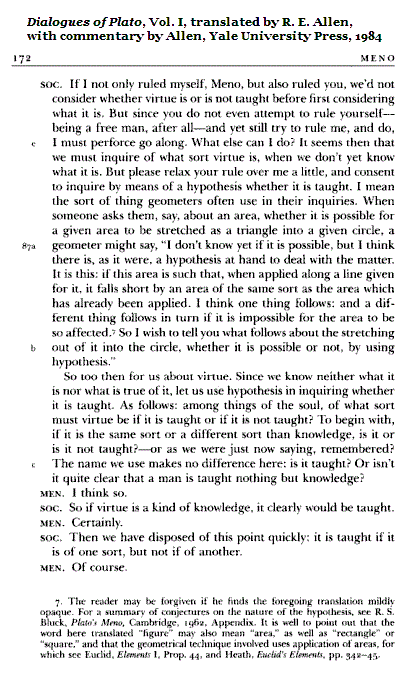
Given these choices for a solution ,
what is a suitable problem ?
The problem sketched on Jan. 22 was a joke.
A more serious triangle-circle-square problem:
Introductory commentary from the same source—
See also a description of this problem by the late William Harris,
Harvard '48, Professsor Emeritus of Classics at Middlebury College,
who died on February 22, 2009*—
"… this is a very important element of method and purpose,
one which must be taken with great seriousness and respect.
In fact it is as good an example of the master describing for us
his method as Plato ever gives us. Tricked by the appearance
of brevity and unwilling to follow through Plato's thought on
the road to Euclid, we have garbled or passed over a unique
piece of philosophical information."
The problem itself, from the Perseus site:
[87a] whether a certain area is capable of being inscribed as a triangular space in a given circle: they reply—“I cannot yet tell whether it has that capability; but I think, if I may put it so, that I have a certain helpful hypothesis for the problem, and it is as follows: If this area is such that when you apply it to the given line of the circle you find it falls short by a space similar to that which you have just applied, then I take it you have one consequence, and if it is impossible for it to fall so, then some other. Accordingly I wish to put a hypothesis, before I state our conclusion as regards inscribing this figure [87b] in the circle by saying whether it is impossible or not.” In the same way with regard to our question about virtue, since we do not know either what it is or what kind of thing it may be, we had best make use of a hypothesis in considering whether it can be taught or not, as thus: what kind of thing must virtue be in the class of mental properties, so as to be teachable or not? In the first place, if it is something dissimilar or similar to knowledge, is it taught or not—or, as we were saying just now, remembered? Let us have no disputing about the choice of a name: [87c] is it taught? Or is not this fact plain to everyone—that the one and only thing taught to men is knowledge?
Meno
I agree to that.
Socrates
Then if virtue is a kind of knowledge, clearly it must be taught?
Meno
Certainly.
Socrates
So you see we have made short work of this question—if virtue belongs to one class of things it is teachable, and if to another, it is not.
Meno
To be sure.
For further details, consult (for instance) a 1955 paper at JSTOR.
* See a post from that date in this journal.
See also a remark by Harris:
"Scholarship has many dark ages, and they do not all fall
in the safe confines of remote antiquity."

